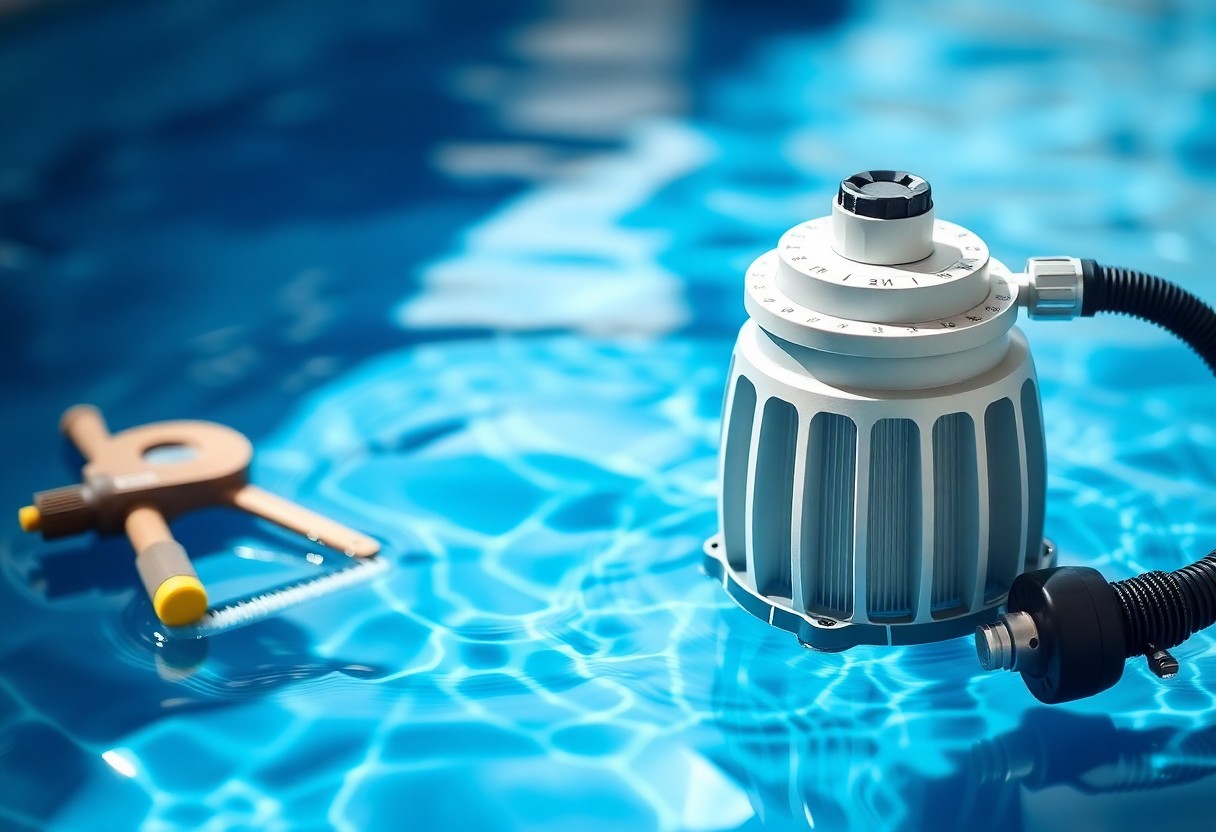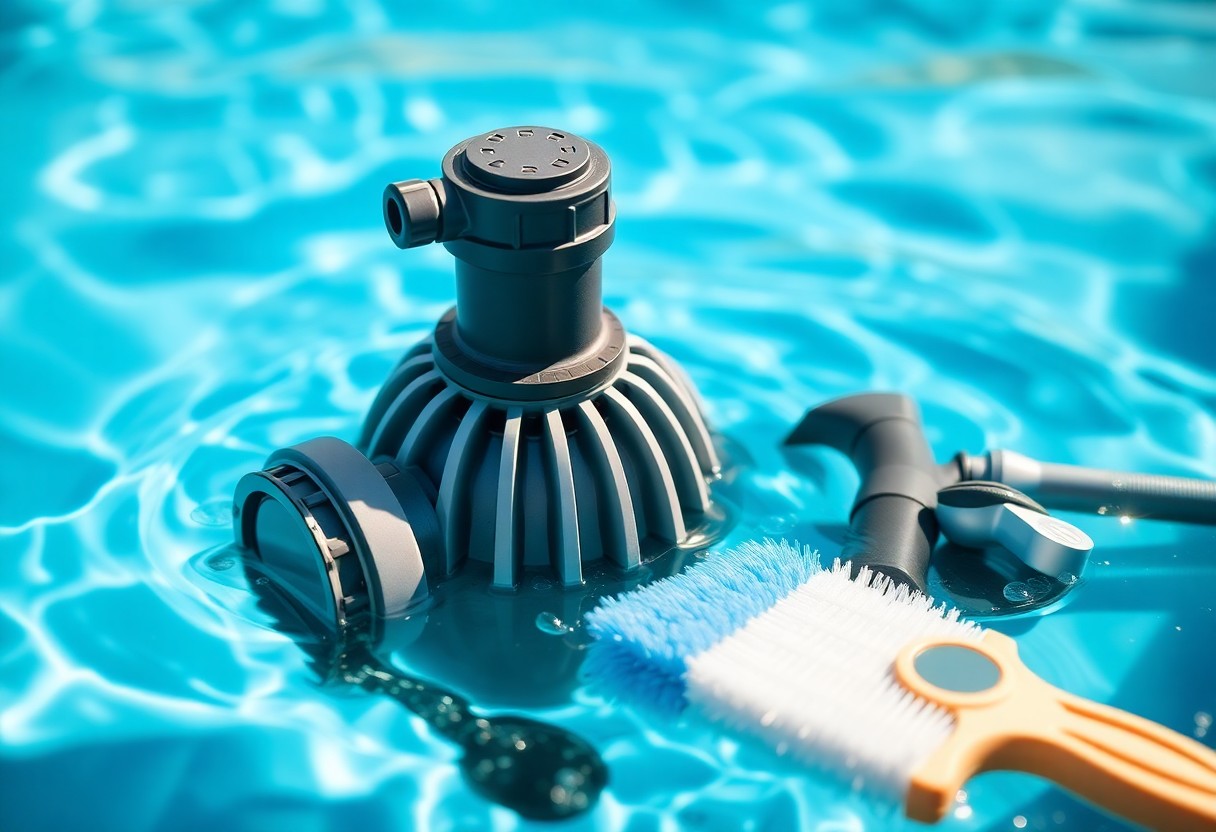With regular pool filter maintenance, you can significantly enhance the quality of your pool water. By ensuring that your filter operates effectively, you reduce the risk of harmful bacteria and algae, which can pose health risks for you and your loved ones. Consistent upkeep not only promotes clearer, more inviting water but also minimizes the need for excessive chemicals, leading to a safer swimming environment. Investing time in routine maintenance today will pay off with cleaner, healthier water tomorrow.
Key Takeaways:
- Regular maintenance of pool filters helps to effectively remove debris, contaminants, and microorganisms from the water, ensuring a cleaner swimming environment.
- Consistent cleaning and servicing of filters enhance their performance and lifespan, reducing costs associated with replacement and repairs.
- Maintained filters contribute to balanced water chemistry, which plays a vital role in preventing algae growth and maintaining proper pH levels for safe swimming conditions.
Importance of Pool Filter Maintenance
The maintenance of your pool filter plays a significant role in ensuring the overall quality of your pool water. Regular upkeep not only promotes a healthy swimming environment but also extends the lifespan of your pool equipment. By dedicating a little time to filter maintenance, you can save money in the long run and enhance your pool’s efficiency. Clean and well-maintained filters help keep your pool water clear, free from harmful bacteria, and safe for swimming, allowing you to enjoy your aquatic space without worry.
Role of Filters in Water Quality
Across your swimming pool system, filters serve as the primary defense against debris, contaminants, and unforeseen pollutants. They capture dirt, leaves, and microorganisms before they can compromise the clarity and safety of your water. A properly functioning filter ensures that these unwanted elements are removed from circulation, enabling you to maintain a sparkling pool that is not only visually appealing but also safe for you and your guests.
Common Issues with Neglected Filters
Issues can arise quickly when your pool filters are ignored. Once filters become clogged or dirty, they lose their ability to effectively remove impurities from your water. This can result in an array of problems, such as cloudy water, an increase in algae growth, and even potential equipment damage. Polluted water is not just unsightly; it poses a health risk, increasing the likelihood of skin irritations and waterborne illnesses.
Understanding the signs of neglected filters is vital for every pool owner. When your filters are not regularly cleaned, they may become breeding grounds for bacteria, leading to serious health hazards. You might also experience poor water circulation, which can create an environment ripe for algae blooms. Moreover, the buildup of debris can strain your pump and other components, resulting in costly repairs or replacements. By prioritizing regular filter maintenance, you safeguard both your health and the longevity of your pool.

Types of Pool Filters and Their Maintenance Needs
While maintaining your pool, it is crucial to understand the different types of pool filters available and their specific maintenance requirements. Various filters have unique functionalities that affect your pool’s water quality, and recognizing these differences can help you optimize your pool maintenance routine. The following table outlines the primary types of filters and their maintenance needs:
| Type of Filter | Maintenance Needs |
|---|---|
| Sand Filters | Backwash every 4-6 weeks, replace sand every 3-5 years |
| Cartridge Filters | Clean cartridge every 2-4 weeks, replace cartridge every 1-3 years |
| Diatomaceous Earth (DE) Filters | Backwash every 4-6 weeks, recharge with DE powder after backwashing |
| Saltwater Filters | Regularly check salt levels, clean cell every 3-6 months |
| Inline Filters | Check and clean frequently, replace as needed |
Knowing which type of filter you have will guide your maintenance practices and enhance your water quality effectively. This awareness allows you to take timely action and ensure the longevity of your pool equipment.
Sand Filters
Above all other criteria, sand filters are popular due to their simplicity and efficiency. They operate by forcing water through a bed of specially processed sand, which traps dirt and debris. Regular maintenance is paramount for optimal performance. You should backwash a sand filter every 4-6 weeks to prevent clogging and ensure that it continues to function effectively.
It’s also important to replace the sand approximately every 3-5 years, depending on usage. Over time, the sand can become less effective at catching debris, which can lead to poorer water quality. By adhering to these maintenance guidelines, you can keep your sand filter running smoothly.
Cartridge Filters
Filters using cartridge systems operate by capturing particles in a pleated filter element, which enables easier cleaning. You must clean the cartridge every 2-4 weeks to prevent a buildup of contaminants that could impact your pool’s sanitation. Depending on water clarity and pool usage, a cartridge might need to be replaced every 1-3 years.
When the cleaning process is followed diligently, cartridge filters provide excellent filtration quality and can maintain a healthy swimming environment. Paying attention to the needs of your cartridge filter ensures that you sustain optimal water clarity while minimizing chemical usage.
Considering the importance of filtration, you must choose the right cleaning products designed for your cartridge type. Proper maintenance leads to improved water quality, contributing to a more enjoyable swimming experience and prolonging the life of your filtration system.
Diatomaceous Earth (DE) Filters
Earth filters are known for their superior filtration capabilities, using microscopic diatoms to trap even the smallest particles. Their maintenance consists primarily of backwashing every 4-6 weeks and recharging them with DE powder afterward. This powder enhances the filter’s performance by increasing its surface area, allowing for better filtration.
In addition, you should monitor the pressure gauge on your DE filter. A significant increase in pressure often indicates that it needs to be backwashed. By adhering to these practices, you can effectively manage your pool’s water quality.
Due to their efficient filtration, DE filters are particularly useful for pools in environments surrounded by trees or heavy debris. Proper maintenance not only optimizes filtration but also protects your pool from potential algae growth, ensuring a safe swimming experience for you and your family.
Step-by-Step Guide to Cleaning Pool Filters
Once again, maintaining a clean pool filter is necessary for ensuring optimal water quality. To simplify the cleaning process, follow this step-by-step guide laid out in the table below. For more in-depth information, check out Pool Filtration System 101: How to Maintain A Clear Pool.
| Step | Description |
|---|---|
| 1 | Turn off the pool pump and unplug the filter system. |
| 2 | Remove the filter from the system, checking for any visible damage. |
| 3 | Rinse the filter with a high-pressure hose to remove debris. |
| 4 | If necessary, soak the filter in a cleaning solution. |
| 5 | Rinse thoroughly to ensure no cleaning solution remains. |
| 6 | Reinstall the filter and turn on the pool pump. |
Frequency of Maintenance
Cleaning your pool filter should be done regularly to maintain optimal performance and water quality. Setting a schedule based on usage can help you nail down the ideal frequency. Generally, it’s advisable to check your filter every month and perform a thorough cleaning every 1 to 3 months, depending on your pool’s usage and the level of debris.
Additionally, keep an eye on your filter pressure gauge; if the pressure is significantly higher than the normal range, it’s a sign that the filter needs cleaning immediately. This proactive approach prevents potential complications, keeping your pool water clear and safe for swimming.
Proper Cleaning Techniques for Each Filter Type
Before you begin cleaning, it’s necessary to understand the specific techniques required for different types of filters—cartridge, sand, and diatomaceous earth (DE) filters. Each of them has unique requirements, which, if not followed, can compromise your filter’s functionality.
But, regardless of the filter type, always prioritize safety by wearing gloves and protective eyewear, especially when handling cleaning chemicals. For cartridge filters, a simple rinse may suffice, while sand and DE filters may require backwashing to clear out trapped particles. Make sure you follow manufacturer guidelines for cleaning to avoid damaging your filter, which can lead to expensive repairs and further issues with water quality.
Benefits of Regular Pool Filter Maintenance
Keep in mind that maintaining your pool filter can significantly enhance your swimming experience. Regular filter maintenance plays a vital role in achieving optimal water clarity and hygiene, which are necessary for a healthy and inviting pool environment. When you routinely clean or replace filter cartridges, you ensure that debris, dirt, and algae are efficiently trapped before they can circulate back into your pool water. This process not only helps to keep your pool looking pristine but also prevents the buildup of harmful bacteria that can pose health risks.
Improved Water Clarity and Hygiene
Below, consider the dual benefits of improved water clarity and heightened hygiene levels. A well-maintained filter allows for better circulation and filtration, resulting in clear water that enhances your overall swimming experience. When visibility is high and the water is free from contaminants, you can enjoy peace of mind while swimming and relax knowing that your pool is safe for both you and your guests. Ensuring regular maintenance prevents any unwanted surprises, such as cloudy water or unpleasant odors, which can arise when filters are neglected.
Extended Lifespan of Pool Equipment
On top of improving water quality, consistent filter maintenance can greatly contribute to the extended lifespan of your pool equipment. When you take the time to clean and service your filters, you’re reducing wear and tear on your entire pool system. A clean filter allows water to flow freely, minimizing the strain on your pump and other components. This can prevent premature failure, ensuring your investment lasts longer and operates more efficiently.
In addition, regularly maintaining your pool filter can also lead to less frequent replacements. Most filters are designed to serve you well for several years, but neglecting them can lead to clogs and breakdowns that may force you to purchase expensive new filters. By committing to a maintenance routine, you not only enhance your current setup but also save money in the long run.
Cost Savings on Repairs and Chemicals
Around the topic of cost savings, maintaining your pool filter is directly linked to significant reductions in both repair bills and chemical expenditures. When your filter is working efficiently, it keeps the water cleaner, which lessens the need for frequent chemical treatments. This can lead to a more manageable and cost-effective approach to pool maintenance over time, allowing you to allocate your budget more effectively.
Benefits of maintaining your pool filter extend beyond immediate visual appeal to the overall vitality of your swimming area. By cutting down on the necessity for repairs and chemical treatments, you can enjoy a cleaner, healthier pool while also protecting your financial investments. This routine not only saves you money but also avoids the headaches that come from unexpected repairs and chemical imbalances.
Signs Your Filter Needs Maintenance
Now, paying attention to the signs that your pool filter needs maintenance can save you a lot of headaches down the line. Regular monitoring can help you catch issues early, maintaining the health of your pool water and ensuring a pleasant swimming experience. Let’s take a closer look at some of the telltale indicators that your filter might not be functioning at its best.
Reduced Water Flow
Above all, one of the first signs you may notice is a reduction in water flow. If the water is not circulating as it should, it’s often indicative of a clog or other obstruction within your filter system. This can lead to stagnant water, which is not only unpleasant but can also contribute to the growth of algae and bacteria, dwindling your pool’s sanitization levels.
Cloudy or Dirty Water
Flow is another clear sign that your filter may require maintenance. If you begin to notice cloudy or dirty water, it could be the direct result of inadequate filtration. A well-maintained filter will effectively remove debris and other contaminants, ensuring that your water remains sparkling clear. If this becomes a consistent issue, it may signal that your filter media is saturated and needs to be cleaned or replaced.
Plus, be aware that cloudy water can also indicate chemical imbalances or insufficient sanitizer levels; however, a compromised filter is often at the root of the problem. Regular maintenance of your filter is important for effective filtration, as failing to address filtration issues can lead to costly repairs or even relegating your pool to an unusable state.
Increased Pressure Gauge Readings
Filter performance can also be quantified by the readings on the pressure gauge. If you notice increased pressure gauge readings, this is a definitive sign that your filter has become clogged or is otherwise not performing efficiently. Gauges that show significantly higher numbers than normal may require you to backwash or clean the filter, as neglecting this issue can lead to further damage.
Maintenance of your filter is vital for keeping your pool system working optimally. Consistently checking your pressure gauge not only helps you assess the condition of your filter but also allows you to take timely action if maintenance is needed. Regular upkeep ensures that your swimming experience remains safe and enjoyable, free from the worries of water quality concerns.

Common Mistakes to Avoid in Filter Maintenance
Overlooking Routine Inspections
Behind every vibrant and inviting swimming pool is a diligent maintenance routine, yet many pool owners fall short when it comes to conducting routine inspections. Regularly checking your pool filter can help you identify potential issues before they escalate into significant problems. By skipping these inspections, you risk allowing debris build-up, clogs, or even mechanical failures to go unnoticed, which can lead to poor water quality and an unhealthy swimming environment. Make it a habit to assess the condition of your filter at least once a week to ensure it’s functioning optimally.
Using Incorrect Cleaning Methods
Incorrect cleaning methods can severely compromise your pool filter’s effectiveness and longevity. Some pool owners might resort to using harsh chemicals, pressure washers, or aggressive scrubbing tools that can damage sensitive components of your filter. Instead, it’s important to employ gentle yet effective cleaning techniques and the correct tools specifically designed for your type of filter. Not only does this preserve the integrity of your equipment, but it also ensures that your pool remains clear and safe for swimming.
Avoid using abrasive cleaning solutions or equipment that could lead to irreversible damage to your filter system. Opt for manufacturer-recommended cleaners and techniques, which will keep your filter in top shape while also enhancing the performance of your pool’s circulation system. By maintaining a careful cleaning strategy, you can extend the lifespan of your equipment, protect your investment, and, most importantly, keep your pool welcoming and healthy for everyone.
Final Words
Now that you understand the significance of regular pool filter maintenance, it’s clear that your pool’s water quality can greatly benefit from consistent care. By routinely cleaning and replacing filter media, checking for clogs, and ensuring that your filtration system is functioning efficiently, you help to prevent the buildup of contaminants. This directly translates to clearer, cleaner water, providing a safer and more enjoyable swimming environment for you and your family.
Moreover, investing time in maintenance not only improves water quality but also extends the life of your pool hardware. A well-maintained filter operates more efficiently, saving you both energy and money in the long run. By following these simple maintenance routines, you can enjoy your pool to the fullest, knowing that you are providing the best possible experience for everyone who dips in. Take ownership of your pool’s upkeep, and reap the benefits of pristine water all season long.
